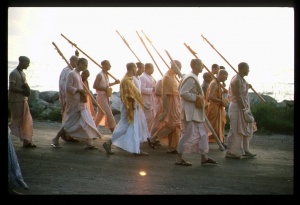CC Madhya 3.127 (1975): Difference between revisions
(Vanibot #0027: CCMirror - Mirror CC's 1996 edition to form a basis for 1975) |
(Vanibot #0020: VersionCompareLinker - added a link to the Version Compare feature) |
||
| Line 2: | Line 2: | ||
<div style="float:left">'''[[Sri Caitanya-caritamrta (1975)|Śrī Caitanya-caritāmṛta (1975)]] - [[CC Madhya (1975)|Madhya-līlā]] - [[CC Madhya 3 (1975)|Chapter 3: Lord Śrī Caitanya Mahāprabhu's Stay at the House of Advaita Acārya]]'''</div> | <div style="float:left">'''[[Sri Caitanya-caritamrta (1975)|Śrī Caitanya-caritāmṛta (1975)]] - [[CC Madhya (1975)|Madhya-līlā]] - [[CC Madhya 3 (1975)|Chapter 3: Lord Śrī Caitanya Mahāprabhu's Stay at the House of Advaita Acārya]]'''</div> | ||
<div style="float:right">[[File:Go-previous.png|link=CC Madhya 3.126 (1975)|Madhya-līlā 3.126]] '''[[CC Madhya 3.126 (1975)|Madhya-līlā 3.126]] - [[CC Madhya 3.128 (1975)|Madhya-līlā 3.128]]''' [[File:Go-next.png|link=CC Madhya 3.128 (1975)|Madhya-līlā 3.128]]</div> | <div style="float:right">[[File:Go-previous.png|link=CC Madhya 3.126 (1975)|Madhya-līlā 3.126]] '''[[CC Madhya 3.126 (1975)|Madhya-līlā 3.126]] - [[CC Madhya 3.128 (1975)|Madhya-līlā 3.128]]''' [[File:Go-next.png|link=CC Madhya 3.128 (1975)|Madhya-līlā 3.128]]</div> | ||
{{CompareVersions|CC|Madhya 3.127|CC 1975|CC 1996}} | |||
{{RandomImage}} | {{RandomImage}} | ||
==== TEXT 127 ==== | ==== TEXT 127 ==== | ||
| Line 32: | Line 31: | ||
<div class="purport"> | <div class="purport"> | ||
Harṣa is described in the Bhakti-rasāmṛta-sindhu. Harṣa is experienced when one finally attains the desired goal of life and consequently becomes very glad. When harṣa is present, the body shivers, and | Harṣa is described in the Bhakti-rasāmṛta-sindhu. Harṣa is experienced when one finally attains the desired goal of life and consequently becomes very glad. When harṣa is present, the body shivers, and one's bodily hairs stand on end. There are perspiration, tears and an outburst of passion and madness. The mouth becomes swollen, and one experiences inertia and illusion. When a person attains his desired object and feels very fortunate, the luster of his body increases. Because of his own qualities and feelings of greatness, he does not care for anyone else, and this is called garva, or pride. In this condition one utters prayers and does not reply to others' inquiries. Seeing one's own body, concealing one's desires and not heeding the words of others are symptoms visible in the ecstasy of garva. | ||
</div> | </div> | ||
Latest revision as of 16:53, 27 January 2020

A.C. Bhaktivedanta Swami Prabhupada
TEXT 127
- nirveda, viṣāda, harṣa, cāpalya, garva, dainya
- prabhura sahita yuddha kare bhāva-sainya
SYNONYMS
nirveda—disappointment; viṣāda—moroseness; harṣa—pleasure; cāpalya—restlessness; garva—pride; dainya—humility; prabhura—the Lord; sahita—with; yuddha—fight; kare—do; bhāva—of ecstatic feelings; sainya—soldiers.
TRANSLATION
The transcendental ecstatic symptoms of disappointment, moroseness, pleasure, restlessness, pride and humility all began to fight like soldiers within the Lord.
PURPORT
Harṣa is described in the Bhakti-rasāmṛta-sindhu. Harṣa is experienced when one finally attains the desired goal of life and consequently becomes very glad. When harṣa is present, the body shivers, and one's bodily hairs stand on end. There are perspiration, tears and an outburst of passion and madness. The mouth becomes swollen, and one experiences inertia and illusion. When a person attains his desired object and feels very fortunate, the luster of his body increases. Because of his own qualities and feelings of greatness, he does not care for anyone else, and this is called garva, or pride. In this condition one utters prayers and does not reply to others' inquiries. Seeing one's own body, concealing one's desires and not heeding the words of others are symptoms visible in the ecstasy of garva.